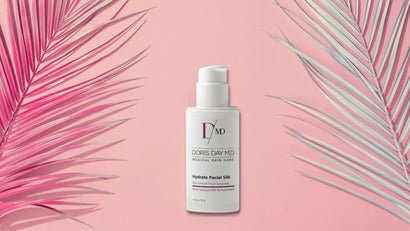These days we want more out of everything if we can get it, especially when it comes to protecting our skin so we can age beautifully, and make any and all of our treatments work better and last longer. Sunscreen ingredients must be FDA approved, as are prescription drugs. There are strict monographs that must be followed in developing new ingredients for sun protection which is why there have not been any new sunscreen ingredients approved in the US in nearly twenty years.

On top of that, there are now advocacy groups scaring the public about the safety of existing sunscreen ingredients, saying they are hormone disrupters and that they are absorbed at unsafe levels for human use. The FDA has now asked sunscreen manufacturers for more data but has not yet removed any ingredients from the market. Oh, and one more thing, there is now also concern about potential damage to coral reefs from certain sunscreen ingredients which, although not proven, has led to the banning of those ingredients in some states like Hawaii.
Sunscreen ingredients
Mexoryl SX: Approved for L’Oreal in 2006, considered to be coral safe
Oxybenzone: This was considered an advancement in broad spectrum UVA/UVB protection but has recently come under attack as being possibly an endocrine disrupter and also potentially damaging to coral reefs. It has now been banned in Hawaii. It is often used with avobenzone to stabilize it and add broad spectrum protection.
Avobenzone: Great for blocking UVA rays but unstable when exposed to light and loses efficacy with an hour or so, making it a good ingredient to combine with other sunscreen ingredients like Mexoryl. The FDA bans combining this ingredient with Zinc or Titanium dioxide in US formulations.
Octinoxate: Used mainly for super absorbing of UVB rays, this is also under attack for possible bleaching and poisoning of coral reefs and has been banned in Hawaii.
Titanium Dioxide and Zinc Oxide: These are only two sunscreen ingredients that are Generally Recognized as Safe and Effective (GRASE). They are not absorbed and are considered broad blockers of UVA and UVB rays, although Titanium dioxide does not block UVA1 rays. Facial Silk Sunscreen from Dr Doris Day Skincare is formulated with zinc oxide and titanium dioxide to provide ultimate sun protection. The addition of melanin, a naturally occurring pigment in the skin, provides antioxidant protection and gives the cream a beige tint that complements a variety of skin tones, making it an ideal choice as a primer under make-up. The silky, matte finish ensures that make-up will glide on smoothly, without a caked-on appearance or feel.
There are some concerns about nano and spray formulations as these should not be ingested or inhaled. Also, high concentrations of zinc-based sunscreens, above 15% may be an issue for coral reefs. For those looking for a pure zinc, supercharged sunscreen, my favorite is the Hydrate Facial Silk. It contains Zinc at 14% along with antioxidant vitamins C, E and Ferulic ester. Also contains 10% squalene and barrier lipids for a foundation like soft finish. It's also 100 fragrance-free and preservative free as well as cruelty-free

Supercharged sunscreens
are ones that are either added to sunscreens or layered along with them to add value and offer extra protection against UV rays, pollution, and oxidative damage, from stress and cellular activity, which causes free-radical formation that damages cells and accelerates aging.
These are not considered sunscreen ingredients and should not be used in replacement of sunscreen. They can be in the form of supplements like Heliocare, which contains a fern-based extract called polypodium leucotomos (PLE) and has clinical data showing it supports sun protection measures. Also, topicals like my Vitamin C serum , which contains a highly potent blend of L-Ascorbic Acid 15%, Tocopherol 1%, Ferulic Acid 0.5%, and a breakthrough Octapeptide, intensified with a Trans-Epidermal Carrier helps to prevent UV and other oxidative damage as well as to reverse signs of aging by helping to increase collagen production, correcting the appearance of hyperpigmentation (aka uneven skin tone), and reducing the appearance of wrinkles. This clinically proven formula features Ferulic Acid to enhance photo-protection of the skin against UV damage by 8 times and reduce sunburned cells by 96%. Stabilized from multiple pathways, the Vitamin C Serum gives outstanding anti-aging benefits with high concentrations of key antioxidants to rejuvenate the skin, fight free radicals, and provide maximum protection against environmental and UV-induced sun damage.
Bottom Line: Your skin is under attack every day by external and internal stressors, we can now supercharge our skin care to provide added defense against UV and oxidative damage, to help keep our skin youthful and beautiful!






![[The Science ] of Longevity: A Skin Focused Approach](http://dorisdaymd.com/cdn/shop/articles/Longevity3-9658695.jpg?v=1765451344)